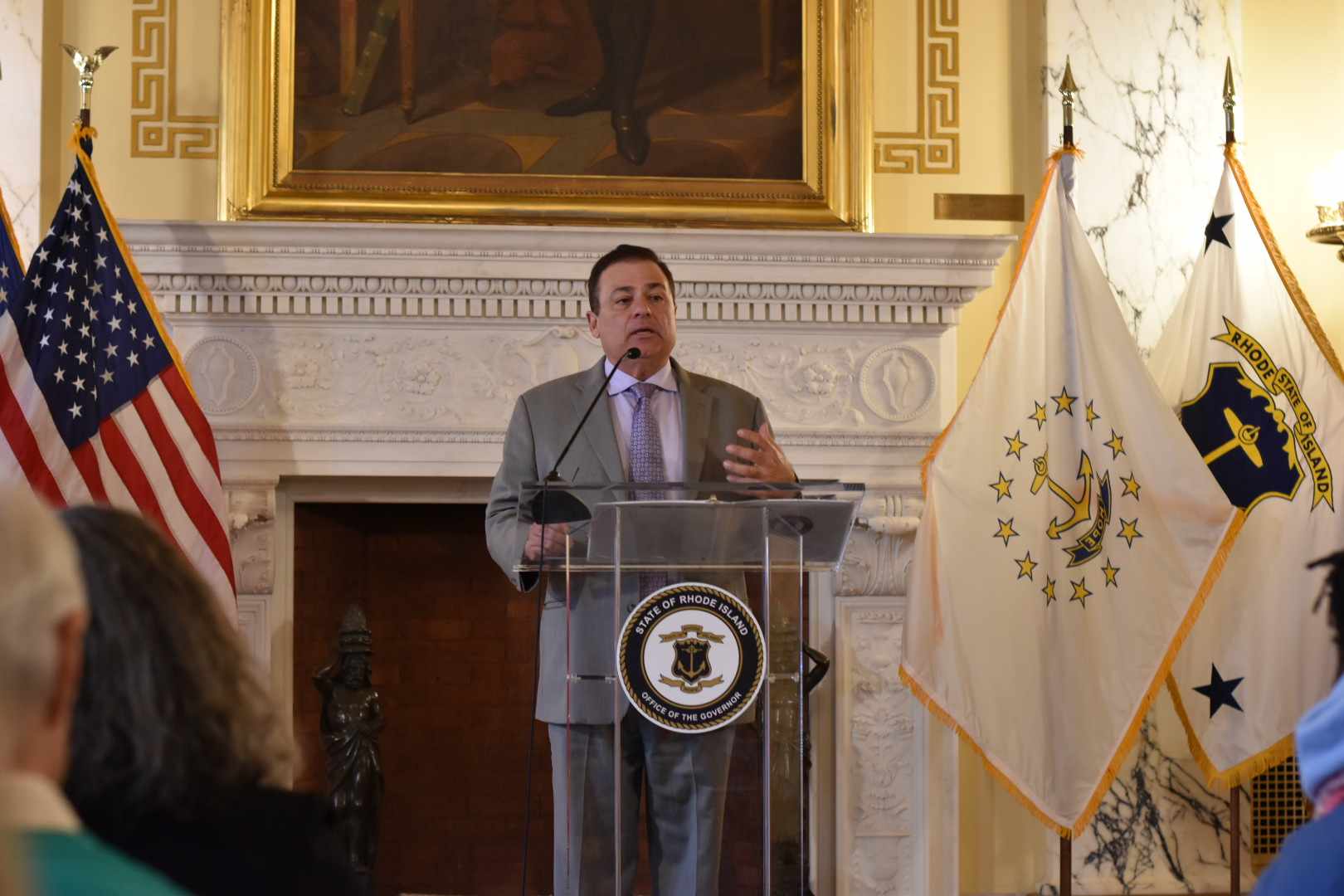Environmental Justice, RIPTA Funding Top Goals of Rhode Island Council
May 6, 2024
PROVIDENCE — The state’s environmental groups rolled out their legislative priorities April 30 at the Statehouse, announcing their focus on environmental justice zones, reducing building emissions, and securing funding for the Rhode Island Public Transit Authority.
The priorities, spearheaded by the Environment Council of Rhode Island, a coalition of more than 60 environmental groups and organizations, were announced during ECRI’s annual Lobby Day at the Statehouse. The event featured speeches from lawmakers, state officials, and Speaker of the House Joseph Shekarchi, D-Warwick.
ECRI’s priorities are centered around seven different individual bills.
The Building Decarbonization Act (S2952/H7617), legislation that would require large buildings statewide to begin tracking the amount of fuel, water and greenhouse gas emissions they consume and produce over a three-year period, with the intention to create a building performance standard to be executed by the Office of Energy Resources (OER).
An additional section of the bills would require all new building construction to be all-electric, using no fossil fuels for heating, cooking, or other processes.
“It doesn’t make sense to build new buildings with fossil fuel infrastructure that’s going to last 20 years when our first major climate goal is six years away,” said Amanda Barker, policy associate for Green Energy Consumers Alliance and a vice president for policy at ECRI.
The Environmental Justice Act (S2535/H8127) would require the Department of Environmental Management to designate specific geographic areas of the state as environmental justice zones based on criteria including low-income levels, percentage of people of color, and lack of English language proficiency. In these areas, state regulators would be required to assess the environmental impact of permit applications, as well as the cumulative impact within the environmental justice zone.
Under current state law, state regulators — DEM, the Energy Facility Siting Board, and others — aren’t allowed to assess the cumulative impacts projects have on their surrounding environment. Adding the requirement has been a longtime goal for environmental advocates who have long argued local sacrifice zones, such as the Port of Providence, only occur near low-income neighborhoods with high populations of Black and brown people and not wealthier communities such as Barrington and Bristol.
Prior versions of the bill have passed the Senate the past three years, but have not managed to secure passage in the House. This year’s Senate version was up for a committee vote April 30 but was postponed to a future date.
ECRI’s last priority is a bill (H7774) introduced by Rep. Karen Alzate, D-Pawtucket, to allocate $78 million to save RIPTA from its fiscal cliff and begin funding the state’s Transit Master Plan, which has been quietly sitting in a drawer unfunded since released by the state at the end of 2020.
Gov. Dan McKee’s budget proposed giving RIPTA $8 million from federal pandemic funds, but that leaves the transit agency almost $10 million short of its deficit. Alzate’s bill would give RIPTA another $24 million. The remaining $46 million would kick-start state funding for implementing the Transit Master Plan.
In prepared remarks, Shekarchi thanked ECRI for its continued environmental advocacy year after year, and pledged to keep the success going. At the end of the 2021-2022 General Assembly session, the group had announced, thanks to the Act on Climate law, that Rhode Island had seen its best legislative session for the environment so far.
“Climate change is real. Anyone who tells you it’s not, don’t believe them, they need a reality check,” Shekarchi said. “It’s not only affecting our environment, it’s affecting our economy and that’s a fact.”
Shekarchi also credited his deputy, Majority Leader Rep. Chris Blazejewski, D-Providence, as “instrumental” in passing the Act on Climate and helping kill a bill in 2022 that would have allowed plastic pyrolysis facilities to be exempt from waste management regulations. The failed pyrolysis bill narrowly passed the Senate.
In addition to the top three legislative priorities, ECRI is supporting dozens of other bills related to the environment, ranging from prohibiting certain rodenticides, to a comprehensive PFAS ban, to CRMC reform.
The list of legislation opposed by ECRI is shorter this year; the group only lists three bills, two introduced by Republicans, one by Democrats, to oppose this session.
Chief among them, S2044 and 7126, introduced by Sen. Jessica de la Cruz, R-Burrillville, and Rep. Michael Chippendale, R-Foster, would require the state to study the environmental impact on developing countries that mine many of the necessary metals that go into building renewable energy facilities.
Another bill, S2155, would require the state to assess whether solar power projects would be carbon-neutral (the bill does not specify what carbon neutral means in its context). A final pair of bills, S2823/H7491, would allow RIPTA to hire design-build contracts and issue bonds and debt for transit projects.




one important area that did not quite make the top 3 were bills S2336 (DiPalma) H7550 (Cotter) to add $16 million for natural area and farmland preservation to the Governor’s proposed “Green Bond” that for the first time omitted those programs. Nature proctection is core to the environment movement even if it didn’t make the top 3, and though the House version was “held for further study” such bills could be normally folded into the budget and it should be.
The RIPTA bills S2823/H7491 unfortuantely are not to enable RIPTA to borrow for “transit projects” but for transit oriented development which could include housing, commercial space, even indoor parking, all outside the expertise of the agency. The bills are really ntended to facilitate moving out of Kennedy Plaza, likely to a remote location (“Siberia” to sue Gov McKee’s word for that) with almost no abutters to object and few who want to go there, yet the debt service usually paid back from RIPTA operating funds could cripple future transiit service. That is one reason ECRI and transit advocates oppose the bills